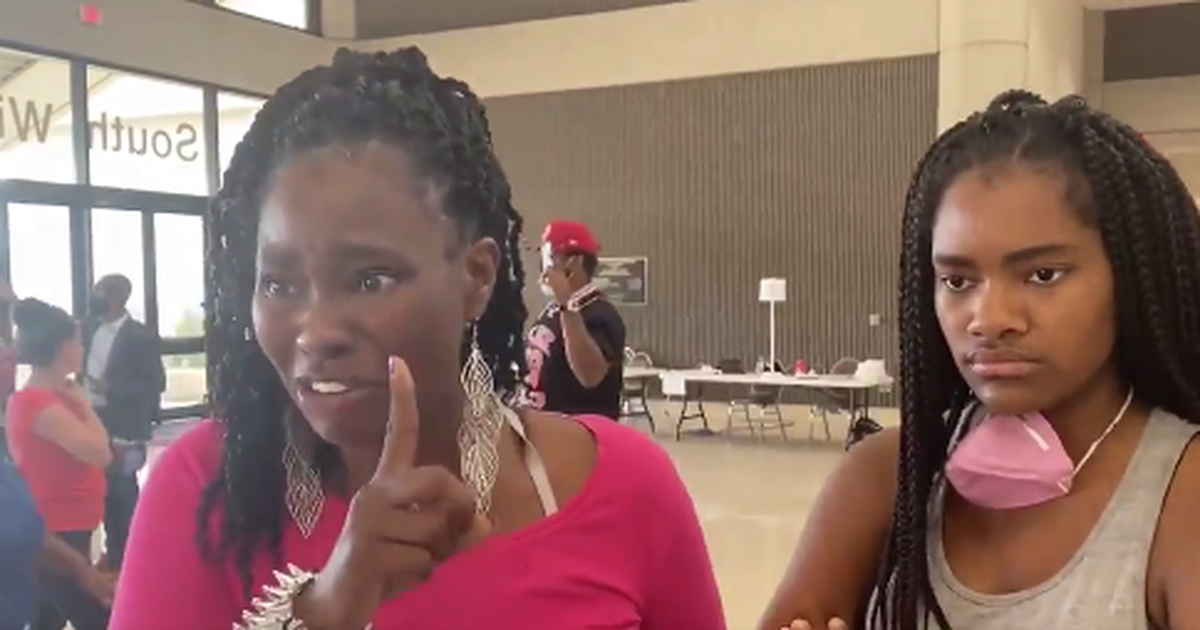
Voting rights activists worried this would happen.
They feared that people would be blocked from voting in Kentucky as the state reduced polling locations due to the coronavirus. Its largest city, Louisville, with a population over 600,000, had just one polling place Tuesday. By 6 p.m. closing, people were running into the Kentucky Exposition Center to make the cutoff. Dozens, many of whom complained of parking congestion on their way in, were locked outside.
So they banged on the doors. They chanted. They demanded they be able to vote. After a judge ordered poll workers to let them in, the Kentuckians cheered as they flowed through the sliding glass doors. Journalist Joe Sonka of the Courier Journal caught the powerful moment on video and shared it on Twitter.
The video, which has been watched more than 1.5 million times as of publishing, captures just how broken voting in America has become. It shows how painful it is to be prevented from voting as the country grapples with a pandemic and confronts a long history of police brutality and systemic racism.
As a gaggle of people enter the exposition center, a Black woman approaches Sonka to explain why voting is so important to her. She’s joined by her 18-year-old daughter, who would be voting for the first time.
“We shouldn’t have to go through all this,” she says as she breaks down into tears. She says her daughter didn’t have a graduation, didn’t have a prom. She’s scared for her son’s life, her nephew’s life, her sister’s life. “Our children are the future. She shouldn’t be going through all this stuff we’re going through.”
Her daughter, with a pink face mask hanging around her neck, interjects every now and then, echoing her mother’s exasperation. “We’re all scared, Mama, we’re all scared,” her daughter says after rubbing her back to comfort her.
“Everybody here is going through something,” the mother says, calling for greater equality. “But we gotta work together.”
The judge kept the polling place open until 6:30 p.m. after Senate candidate Charles Booker demanded the extension. Afterward, his primary opponent, Amy McGrath, asked for one, too. Both are running for the Democratic nomination to challenge Republican Sen. Mitch McConnell, the Senate majority leader.
The scene in Louisville is just one of many examples of a voting system under pressure due to the coronavirus. Georgia, which held primaries earlier this month, saw long lines, with some voters in the Atlanta metropolitan area waiting hours to cast their ballots. The same happened in Wisconsin in April.
Georgia and Kentucky both have vote-by-mail, but that didn’t prevent headaches at polling places in both states. In addition to fewer locations, states across the country have been dealing with fewer poll workers, with people choosing to stay home due to the virus. Then there’s Texas, which has been pushing back against changing its restrictive vote-by-mail rules. Meanwhile, President Donald Trump has been spreading lies about the safety of absentee ballots on Twitter. The social media platform recently started pushing back, adding a fact check label to a few of Trump’s tweets.
Come November, will Kentuckians face the same voting hurdles? Will Georgians? Will mail-in ballot rules be relaxed? Many questions about the general election remain unanswered, during a time of heightened uncertainty in a nation under stress.
